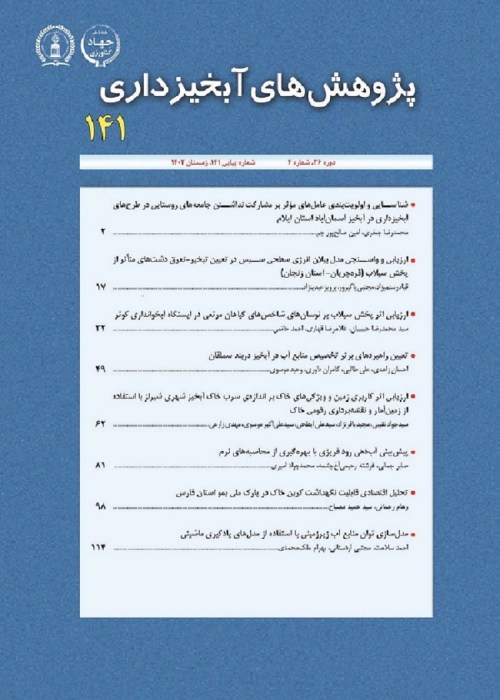Experts' Viewpoints on Prioritizing Factors Affecting Lack of Sustainable Participation of Rural Communities in Watershed Management Projects on the Moradabad Watershed, Meymand the Province of Fars
A lack of sustained enthusiasm for participation in watershed management by the rural communities constitute a deterrent for rehabilitation of our drastically disturbed watersheds. Therefore, it is necessary to find the reasons if the concerned authorities to encourage them to share the burden of conservation activities on the catchments they live on, or benefit from. To this end in this research was done the priority of the factors affecting the preventing sustainable participation of rural societies in watershed management projects from experts' viewpoints in Moradabad watershed of Meymand, in southwest of Fars province. The method of preparing and completing 57 questionnaires was analyzed by T test, Analytical Hierarchy Process and Friedman nonparametric test. The results showed that from the viewpoint of experts in the Moradabad watershed of Fars province, the "economic", "educational-extension", "design-executive" and "social" indicators, respectively, have the maximum and minimum priority of non-participation sustainable rural communities are in watershed management projects. Also, the most important sub-indicators on the lack of sustainable rural societies participation in the watershed management projects in this watershed are: "low income residents of the basin", "ignoring income for the people as a direct incentive to implement plans Watershed management", "lack of training residents of the basin regarding the plans and objectives" and "low level of literacy and awareness". The range of average ratings varies from 4.85 to 8.25, so that the sub-indicator "low income residents of the watershed" with an average rating of 8.25 has the highest relative priority and "late return of watershed projects" with an average of 4.85 had the least relative priority in the lack of sustainable participation of rural societies in the watershed management plans in this watershed. This results could be used by the watershed projects planners for achieving the optimum results. It is suggested that the "activities of NGOs" and "training of exploiters", along with factors such as "implementation of multipurpose projects", taking in to account the interests of watershed dwellers in order to improve the economic conditions, to create the basis for trust and should be taken attract to active participation in the watershed management projects.
- حق عضویت دریافتی صرف حمایت از نشریات عضو و نگهداری، تکمیل و توسعه مگیران میشود.
- پرداخت حق اشتراک و دانلود مقالات اجازه بازنشر آن در سایر رسانههای چاپی و دیجیتال را به کاربر نمیدهد.



